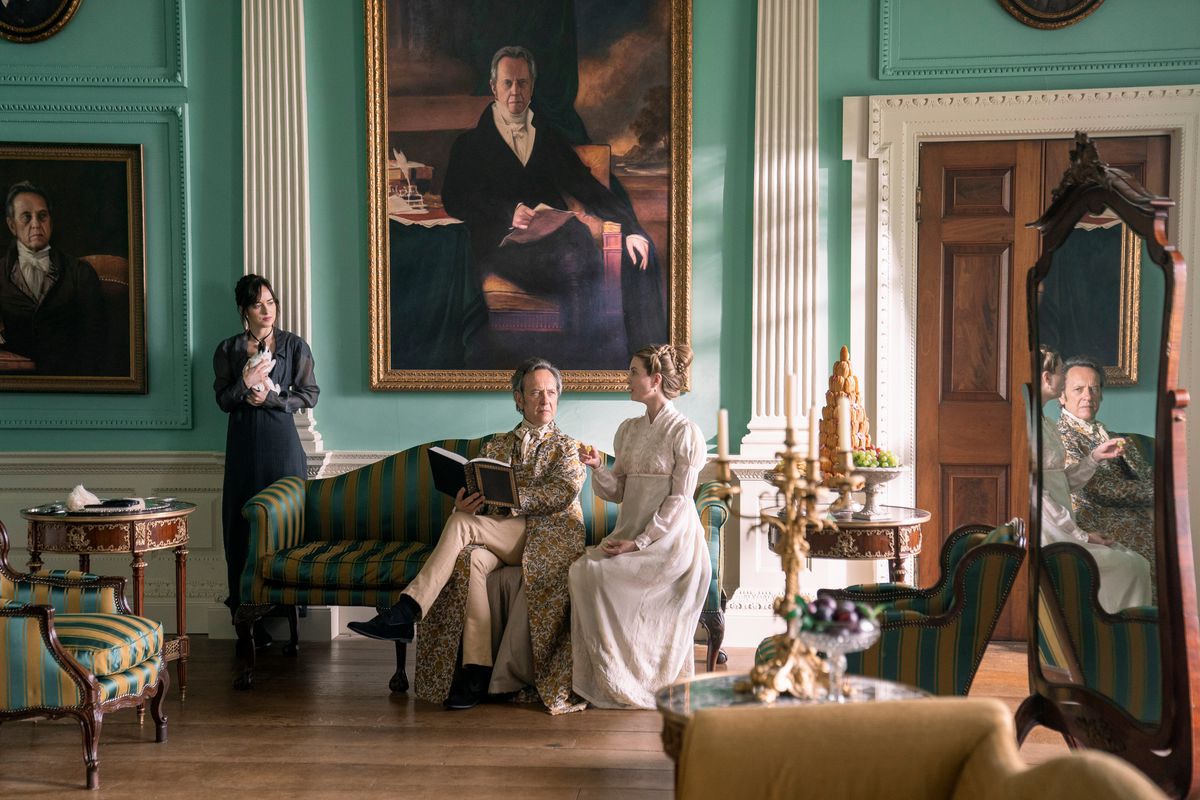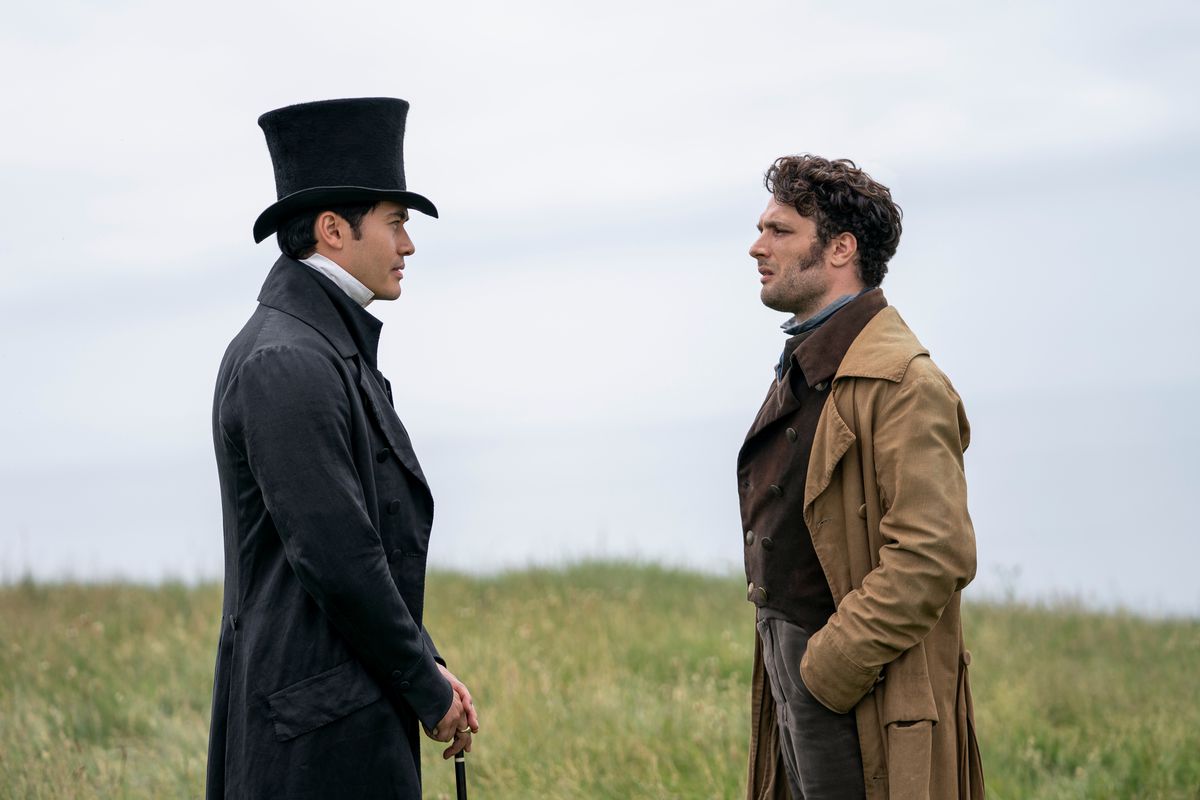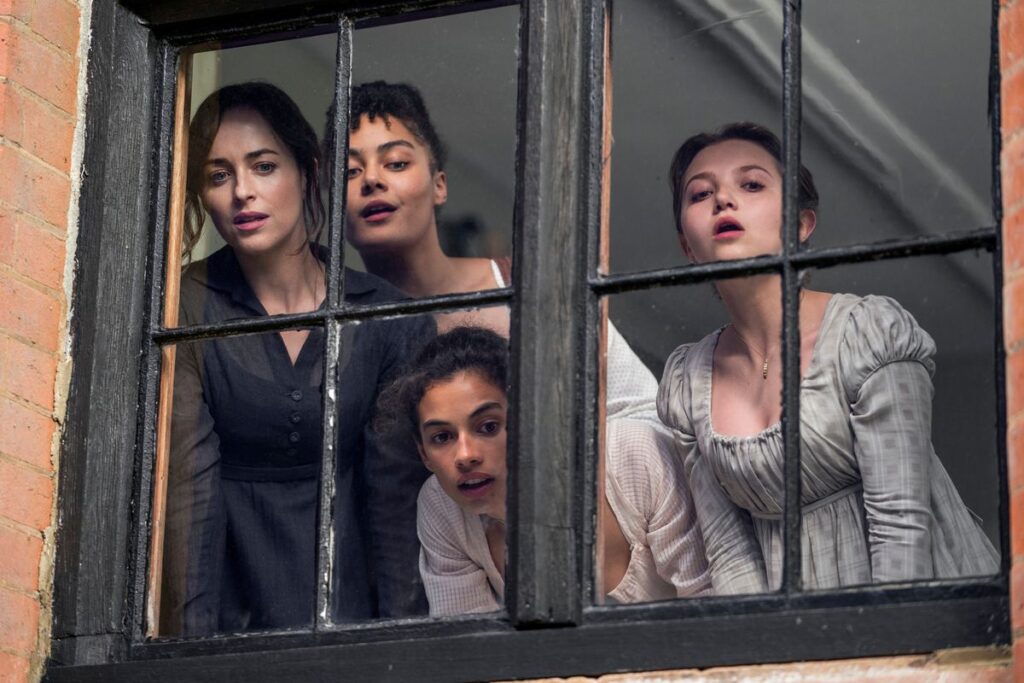Out of all of Jane Austen’s novels, Persuasion may be the most difficult to adapt for modern audiences. While it contains some of Austen’s iconic wit, it’s also the most pensive of her novels, and it’s built around societal norms specific to Regency-era society.
But instead of grappling with making these themes resonate in 2022, or taking time to let the book’s more thoughtful moments breathe, Carrie Cracknell, director of Netflix’s new movie version of Persuasion, decided to turn its lead character into a #relatable mess. (The hashtag is necessary here.) What could be a perfectly fine period adaptation turns into an agonizing hodgepodge of a movie, with an oddly modern twist on the heroine that’s at jarring odds with what’s mostly a sedate Regency-era romantic drama. The stellar supporting cast is all bogged down by weird dialogue choices, as the filmmakers try to make the movie both an edgy anachronistic take and a more traditional adaptation, and fails at both.
[Ed. note: This review contains setup spoilers for Netflix’s Persuasion.]
Photo: Nick Wall/Netflix
Like the original Jane Austen novel, Persuasion follows the travails of Anne Elliot (Dakota Johnson), a 27-year-old woman who’s on the brink of spinsterhood by Regency standards. Eight years ago, she turned down a proposal from a dashing but penniless sailor, apparently ruining her one chance at love. She lives with her self-absorbed father and eldest sister, but when her family’s extravagant spending forces them to rent out their grand estate, a naval officer and his wife move in. That wife’s brother just happens to be Captain Frederick Wentworth (Cosmo Jarvis) — the man Anne rejected in her youth, who has found great success in the Navy.
The movie’s biggest, most obvious, most grating flaw is that for some inexplicable reason, screenwriters Ronald Bass and Alice Victoria Winslow decide to have Anne narrate the movie. And not just narrate it, but talk directly to the camera, throwing it pithy glances and rolling her eyes in response to her obnoxious relatives. She’s a Regency-era Fleabag, even though that characterization is at total odds with the original character.
In an effort to make Anne’s struggles with class expectations and societal norms more relatable, Cracknell and the writers apparently decided to make her a quirky free spirit. She gets wine-drunk and yells Frederick’s name out of a window, because she knows he’s at a party across the lawn that she can’t attend because she’s tending to her sick nephew. She replies to her sister’s egocentric rambles in Italian. She puts on a breadbasket as a hat and slathers a jelly mustache over her lip to amuse her young nephews.

Photo: Nick Wall/Netflix
All of which could be fine, except that in the original book, Anne’s whole deal is that she’s reserved, gentle, and sensible — and that the people in her life can too easily persuade her (get it?) to conform to what’s expected of her. Making her a snappy, judgmental, sassy heroine completely undermines her character and guts the novel’s themes. Contrary to popular belief, not every Austen heroine is a Lizzie Bennet or Emma Woodhouse. So much of the original Anne’s journey is about realizing she doesn’t have to conform to expectations. But having her already be snippy and eccentric completely defeats that whole character arc. It’s hard to believe that the Anne who insults her family under her breath is the same one who caves to societal norms.
It certainly doesn’t help that Johnson can’t pull off the same witty, pointed looks that made Phoebe Waller-Bridge’s character Fleabag so iconic. She more or less makes the same perfectly pleasant face whenever she looks into the camera, occasionally raising an eyebrow. It’s a pity, because when Johnson gets to play Anne as just Anne — a mild-mannered, capable, but deeply sad woman — she does a lovely job. When she looks at the seaside, then at Frederick, saying nothing, her longing for days gone by is palpable. If the movie just played it all straight, without the fourth-wall narration, then Johnson and Jarvis could really indulge the deep mutual pining.

Cracknell and the rest of the filmmakers cannot stay away from stylish Bridgerton and The Great-esque anachronisms, but they never actually commit to those shows’ funky out-of-time vibe. Beyond Anne’s painful narration, the only other modern snippets are jarring lines that feel completely out of place with an otherwise completely straight period drama. Characters frequently blurt out things like “I’m an empath!” or “If you’re a five in London, you’re a 10 in Bath,” in moments that are utterly discordant amid the otherwise period-typical dialogue. Nothing else about the movie adheres to that same time misplacement, from the traditional orchestral score to the set and costume design.
Janky anachronisms and grating narration aside, the film is aggressively OK, though the dynamic side characters do most of the heavy lifting. Every role is beautifully cast, but none so much as Anne’s insufferable family. Richard E. Grant commands every scene he’s in as the narcissistic Sir Walter Elliot. Crazy Rich Asians star Henry Golding plays Anne’s distant cousin, and he fully sells his character’s dual sides as both charming and conniving.

Photo: Nick Wall/Netflix
And as Anne’s youngest sister, Mary, Mia McKenna-Bruce is a surprise scene-stealer. She pouts and whines and is completely unaware of her terrible behavior. She’s an utterly delightful example of the character viewers love to hate. Unfortunately, Anne outright tells the audience what Mary is going to do right before she does it, and explains how she’s going to react to inconveniences around her, which robs McKenna-Bruce’s performance of most of its power.
There are two movies battling it out in Netflix’s Persuasion. One is a quirky, modernity-infused retelling, and one is a more straightforward adaptation that stays true to the time period. Perhaps the first felt like too much of a risk in an adaptation of a classic. Perhaps the second was too boring to the filmmakers. Whatever the case, Persuasion is a movie caught between jarring tones and never committing to either. With just a little trimming, it would be a solid adaptation. Turning it into an anachronistic girl-power story would require more ambition and effort than this film shows, but it could be done. Instead, Persuasion is caught in a weird limbo, and even its best parts can’t quite break free of the painful ones.
Persuasion is out on Netflix now.

